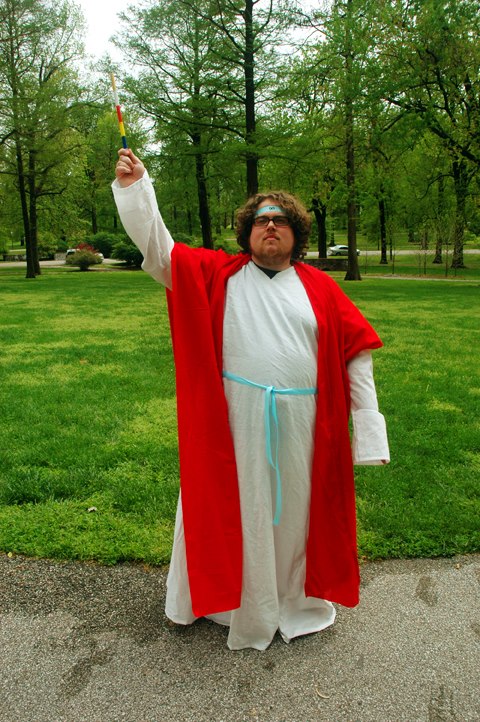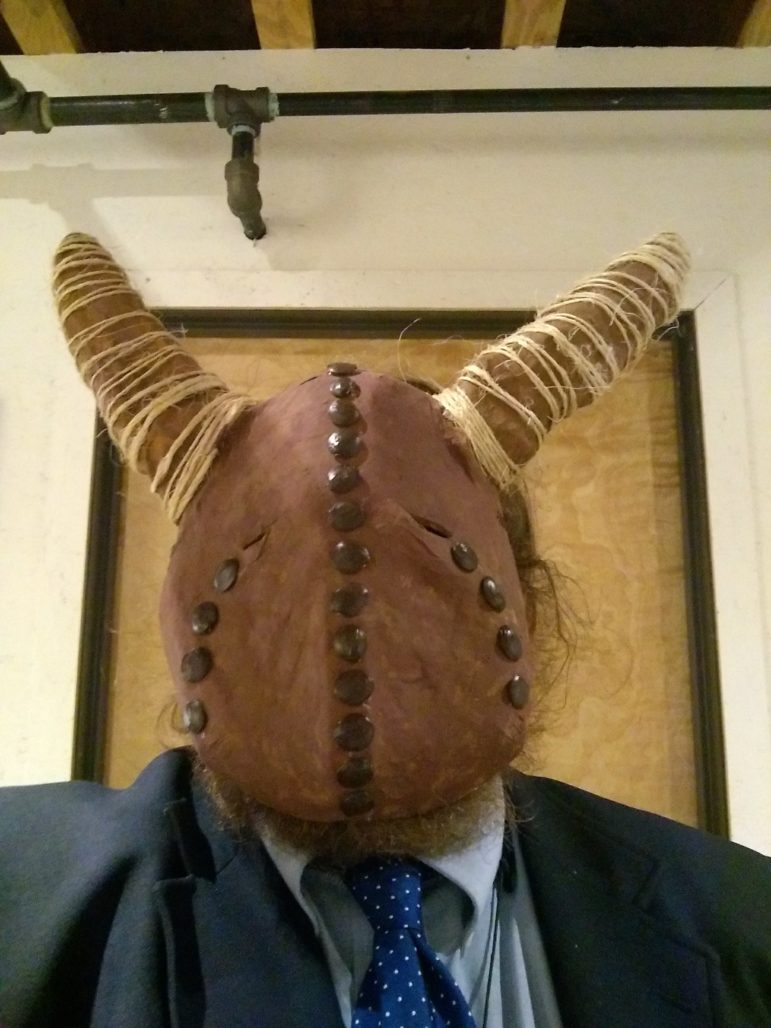
Last Saturday, I did something that I’ve never done before: I led a ritual without a script.
In my family’s tradition of Wicca, the responsibility of holding a sabbat carries with it the expectation that one will write a new and original ritual. That’s not to say that every ritual is completely idiosyncratic – they’re still obviously all Wiccan rituals, and they share a ritual grammar that would be instantly recognizable to anyone generally familiar with Wicca. A circle gets cast; elements get called; at some point a knife gets dipped into a cup. But past that basic framework, every ritual was different, down to the words by which we called quarters. (In aggregate, I’d guess half the lines of verse I’ve ever written have been variations on elemental invocations.)
As a result, I grew up participating in rituals that had narrative voices as distinct as any novelists’. We were all Wiccans, all members of the same line of covens, but each of our rituals communicated something distinctive about the hosts’ worldview. One of my elders, always fascinated with science, found ways to incorporate the latest news from the worlds of biology or physics into his rituals. Another has a sentimental heart and a love for Victoriana, and her rituals, often held in the winter, brought in old-fashioned traditions like wassailing and candle-making. Still others brought in their backgrounds with other traditions – ceremonial magick, Buddhism, Heathenry – and flavored their rituals with those inclinations.
When Sarah, my coven-sibling and ritual partner, and I were old enough to start hosting sabbats, we went for the big and theatrical. We loved to put on passion plays with as much pomp and theatricality as we could afford (which wasn’t much). We planned out our first decade of sabbats as a grand cycle, operatic in scale: each year we picked a new sabbat from the list and prepared a festival drawing on a culture and mythology that we had never explored before. We were grand dillitentes of magick, constantly in search of something novel to add to our rites.

Your humble author as the magician of the tarot deck, 2014 [Eric Scott]
As a writer and a sometime-academic, this approach to ritual seemed natural to me. It was like writing a play – a play with a very defined structure and form, adhering to certain unities of time and space that Aristotle might have found peculiar, but a play nonetheless. Sarah and I may not have had much of a budget at our disposal, but sometimes we managed to include “special effects” that seemed pretty clever to us. We once held a Candlemas with the entire ritual in the dark. We based the ritual around the myth of Hathor becoming Sekhmet and needing blood-colored beer to satiate her violent lusts; Sarah crept around the pitch-black circle sounding a cow-bell while aspecting Hathor, then dragged a single talon along the backs of the congregants while snarling at them with the voice of Sekhmet. The props were simple, but from my place in the center of the circle, I heard surprised shivers as the lion-headed goddess marked her prey.
Once, while in the process of writing my doctoral dissertation, I had coffee with my advisor to discuss some of the material. I had a section of an essay that talked about my family’s rituals, how we wrote them and produced them, about the quirks and idiosyncrasies that made their way into our ceremonies. My advisor smiled, almost smirked. “Religion as a creative act,” she said. “It seems like such a strange concept.” Religion, as she understood it, was based on tradition and repetition, and religious rituals remained fixed over the course of time. She’s hardly the only one who has that understanding of religious ceremony, either: the Oxford Living Dictionary glosses “ritualistic” as “invariably performed in the same way,” and there are many schools of Paganism that follow a more-or-less rigid schedule of rituals that have a set form and liturgy.
For me, though, the continual reinvention of the ritual was one of the most important features of my family’s approach to Witchcraft: while we gathered every year on these eight sabbats, we understood that every sabbat is its own individual occasion, and that one Ostara or Lammas could provide a separate meaning from any other. We were always doing the same ritual, but always also doing a different one. That, to me, was the essence of Wicca.
Recently, though, I felt some dissatisfaction with my rituals, or at least with the way I was writing them. I began to question my motives as a ritual composer: what was I trying to achieve with my artifice? There isn’t anything wrong with theatricality if it’s in service to a deeper magickal effect within the ritual, but I had begun to wonder if I was only trying to show off. I also felt as though I had lost a sense of immediacy and spontaneity in sticking to the forms I had been working with for so long.
I discussed this with Sarah as we prepared for Yule the year before last. We had done some interesting Yule ceremonies in the past – a Nordic-themed ceremony with Hodr and Baldr as the Oak and Holly Kings, a ritual done entirely in Christmas carols, and others besides – but we felt bored with the standard tropes of the holidays. I still hadn’t written much of a ceremony when Sarah arrived at my house, carrying with her a trunk full of papier-maché masks.

[Eric Scott]
They were strange and off-putting, especially the eyes, which Sarah had cut such that they looked upturned. She had painted them in earth-tones and decorated them with rough twine. They were the most abstract props we had ever used, and even as the ritual started, we weren’t entirely certain how we would make use of them in a Yule ritual.
We shouldn’t have worried. We had small children in the circle with us, and they knew exactly what to do with their masks. As soon as their parents had laced the masks around their heads, they began growling and marching, and soon so were the rest of us, a pack of Krampuses dancing a wild rumpus around my back yard. We knew what to do without being told, and though it was the strangest Yule ritual I had ever been a part of, it also felt absolutely in the spirit of the night.
I’ve spoken of rituals as plays, which can be a useful metaphor – but it might be just as productive to think of them as poetic forms. A sonnet is always a sonnet, fourteen lines and a few different patterns of rhyme, but the actual sonnet can be anything at all. The theory of oral-formulaic composition advanced by scholars such as Albert Lord and Milman Parry, though out of fashion, suggested that even masterworks of epic poetry like the Odyssey and Beowulf could have been formed largely through improvisations by oral poets deeply enmeshed in a certain poetic grammar.
I make no such grand claims for my own rituals, but I have thought much over the past two years about the nature of a Wiccan ritual grammar – a concept which applies readily to other Pagan and Heathen traditions as well – and how such a framework not only provides a guide to the structure of a formal, rehearsed ceremony, but also to freer improvisations. There is powerful magick in knowing what exactly one will say and do in a ritual, but there is also something inspiring about not knowing what exactly will happen, what words will come in the moment.

Beltane altar [Eric Scott]
At Beltane we draped a gingko tree in ribbons to make our Maypole, and the rest we made up as we went along. It was not the smoothest or most impeccable ritual I have ever run, and reviewing it now, I am certain there were points where I rambled or stumbled over my words, as did the others in our circle. But it was Beltane, and the energy of the world that is yet to come was spilling over into our world everywhere around us. Even when we missed a step, every one of us still knew the dance by heart.
The Wild Hunt is not responsible for links to external content.
To join a conversation on this post:
Visit our The Wild Hunt subreddit! Point your favorite browser to https://www.reddit.com/r/The_Wild_Hunt_News/, then click “JOIN”. Make sure to click the bell, too, to be notified of new articles posted to our subreddit.